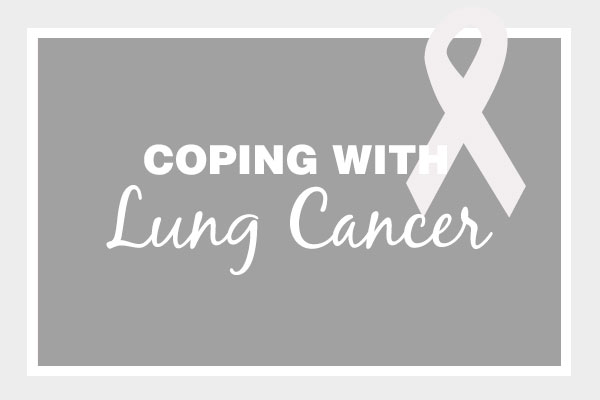Coping with Lung Cancer
How to Survive the Emotional Fallout
Living with lung cancer can often affect your emotional and mental health. Depression, shock, anxiety, and even panic are some possible reactions to a lung cancer diagnosis.
The emotional impact of a lung cancer diagnosis on an individual or family can vary greatly depending on the extent of the disease, its treatment, and each person’s situation and personality. At cancer support organizations, people with lung cancer learn that, by sharing their experiences and supporting each other, they can begin to cope with the emotional distress associated with cancer.
Learning you are not alone can be a valuable tool to have. It’s a good idea to find people with whom you can share and express your feelings. Some people are able to do this with close friends and family; others benefit from talking one-on-one with a therapist, counselor, or clergyperson, or by joining a cancer support group.
STRESS
The diagnosis and treatment of lung cancer can cause a great deal of stress. Three of the most common social and emotional stressors for people with cancer are:
• Loneliness Some cancer support organizations are available to connect you to people in similar situations throughout the lung cancer experience. These connections can help reduce the feeling that you are alone and increase your access to support.
• Loss of Control When you participate actively in decisions that affect your treatment and your daily life with lung cancer, you take back some control over your life.
• Loss of Hope There are many forms of hope, and what is hoped for may change. For example, when physical cure does not seem possible, the focus can shift to hope for physical comfort and emotional and spiritual healing.
Managing Stress
Stress management techniques can become valuable tools you can use. There are many ways to cope actively with cancer to increase your sense of well-being.
For example:
- Express your emotions. Do not keep feelings inside – they will only become more overwhelming.
- Be mindful and allow for reflection. Use prayer, meditation, or deep breathing and relaxation exercises.
- It is very helpful to maintain some level of physical activity when living with a cancer diagnosis. Walking, yoga, qigong, and many other types of physical activity can help you to manage your emotions and mood.
DEPRESSION AND ANXIETY
Sometimes the emotional, social, or spiritual effects of lung cancer can feel unmanageable. You may find that you have lost interest in things that used to make you happy. Discuss these feelings with your healthcare team; they may be able to help. Your team may prescribe a change in your medicines or recommend that you speak to an oncology social worker or therapist.
Signs of depression include:
- Persistent sad or empty feelings most of the day
- Loss of interest or pleasure in ordinary activities
- Difficulty sleeping
- Change in appetite
- Change in body weight (loss or gain)
- Difficulty concentrating or making decisions
- Fatigue or restlessness
- Thoughts of suicide or death
Get Help
If you or a loved one has thoughts of suicide, help is just a phone call away. Call the National Suicide Prevention Lifeline at (800) 273-8255 to talk to a skilled, trained counselor near you. This service is available 24 hours a day, seven days a week.
ANGER
Anger is a normal response to being diagnosed with lung cancer. It is an emotion you may feel at any point as you go through treatment. You may think, “Why me?” You may feel angry at the tobacco industry, your doctor, or the sight of others smoking. If you currently smoke, you may feel angry or guilty when others mention quitting when you feel as though smoking is your only “comfort” left.
Some people feel angry when they are not communicating well with their healthcare team or family. Feelings of lack of communication may be a temporary reaction, or they may indicate a deeper concern that needs to be addressed. Ask your healthcare team to help you find resources that can help you deal with anger. You also can learn how to control how you respond to stress.
Excerpted with permission from Frankly Speaking About Cancer: Lung Cancer © Cancer Support Community. For more information about lung cancer, visit CancerSupportCommunity.org/Lung. For more information about the Cancer Support Community, call (888) 793-9355 or visit CancerSupportCommunity.org.
This article was published in Coping® with Cancer magazine, July/August 2018.


